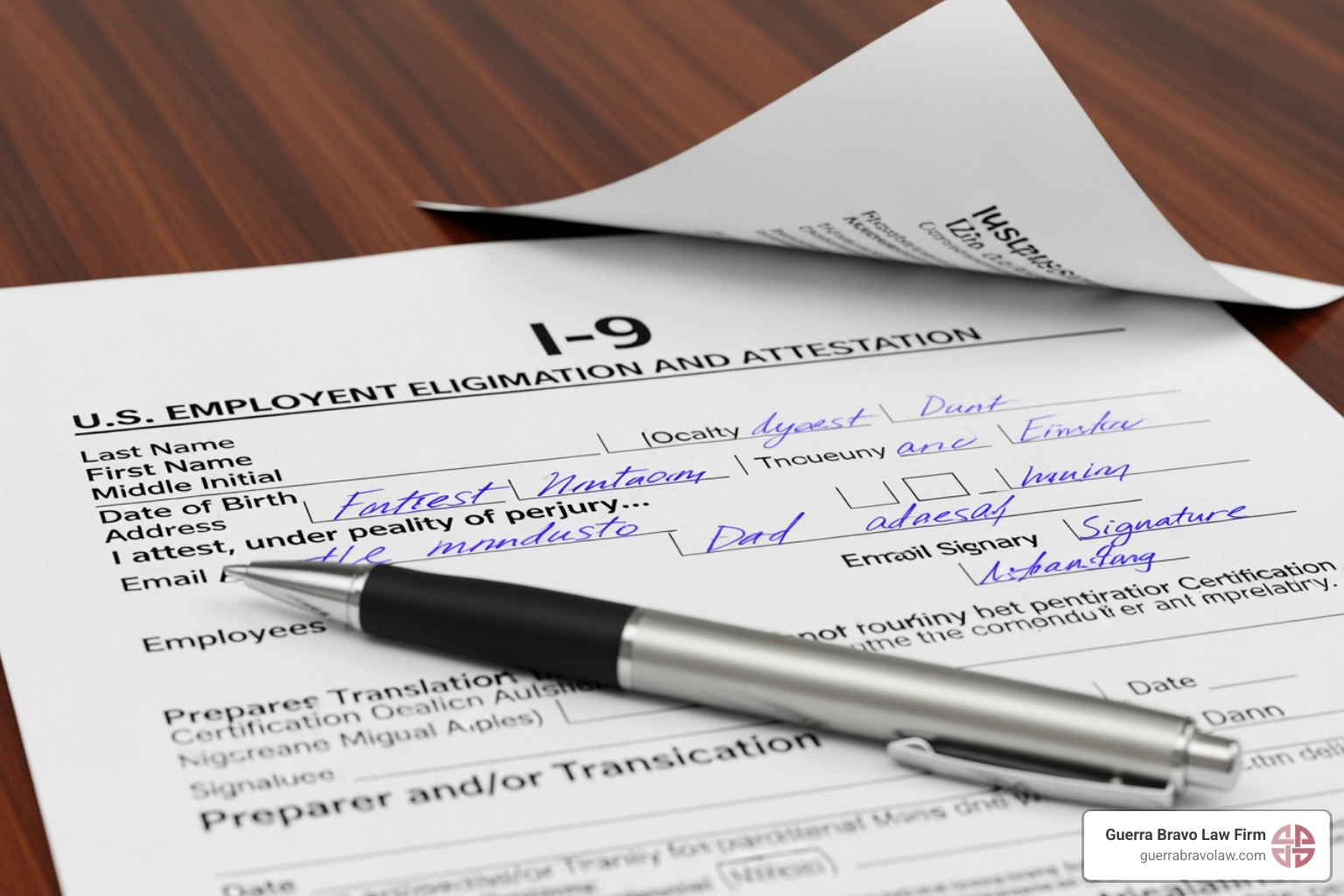
Navigating the Maze: Understanding Immigration Compliance
What Immigration Compliance Really Means for Your Future
What is immigration compliance? It's the adherence to all laws governing the entry, stay, and employment of foreign nationals. For employers, it means verifying work authorization, maintaining documentation, and following reporting rules. For individuals, it involves maintaining lawful status and meeting all visa conditions.
Violations can lead to severe consequences, including fines up to $28,619 per employee, criminal prosecution, visa revocations, and even business closure. With worksite enforcement actions on the rise--ICE arrested 2,304 people at worksites in fiscal year 2018 alone, a seven-fold increase over the prior year--the stakes have never been higher. One mistake can derail everything.
Immigration compliance is not a one-time checkbox; it's an ongoing obligation. The challenge lies in understanding which rules apply to your specific situation and proving you've followed them. The good news is that compliance is achievable. This guide breaks down the complexities into actionable steps, covering employer responsibilities, enforcement actions, penalties, and strategies to protect your business or immigration status.
What is Immigration Compliance and Why Is It Crucial for Your Business?
At its heart, what is immigration compliance is about following the rules that govern how non-citizens enter, stay, and work in a country. For employers, this means verifying every hire's legal work authorization, maintaining proper records, and fulfilling reporting duties for sponsored workers. For individuals, it means keeping your visa status valid and respecting all restrictions. This isn't just bureaucracy--it's what keeps your business legally sound, your operations stable, and your workforce protected.
Defining What is Immigration Compliance
Immigration compliance covers the full spectrum of legal duties associated with hiring foreign nationals or maintaining your own immigration status.
For employers, compliance begins at hiring. The Immigration Reform and Control Act of 1986 (IRCA) mandates that you complete Form I-9 for every employee to verify their identity and work eligibility. If you sponsor foreign workers via H-1B or L-1 visas, your obligations expand to include filing labor condition applications, maintaining Public Access Files, and reporting any changes in employment.
For individuals, compliance means adhering to the rules of your specific visa. This could mean working only for a specific employer, adhering to part-time work limits while studying, or maintaining continuous residence. You are responsible for notifying USCIS of address changes and renewing documents on time.
The legal foundation in the United States is the Immigration and Nationality Act (INA), with detailed regulations in Title 8 of the Code of Federal Regulations. Our firm focuses on helping Texas businesses and individuals steer this complex U.S. system.
The Importance of a Proactive Stance
Ignoring immigration compliance invites disaster. The consequences of non-compliance are severe and far-reaching.
Financial Risks: Paperwork violations on Form I-9 can cost up to $2,821 per offense. Knowingly hiring an unauthorized worker can lead to fines escalating from $5,724 to $28,619 per employee for subsequent offenses. These fines can quickly become business-ending.
Criminal Liability: A "pattern or practice" of knowingly hiring unauthorized workers can lead to criminal charges, imprisonment, and a permanent record for business principals.
Loss of Sponsorship & Contracts: Non-compliance can get you barred from sponsoring foreign talent, cutting off access to skilled workers. If you hold federal contracts, violations can result in debarment, locking you out of future government work.
Reputational Damage: News of immigration violations spreads quickly, eroding public trust, damaging your brand, and making it difficult to attract talent and customers.
Business Disruption: Worksite enforcement actions, like audits or raids, grind operations to a halt. As The National Immigration Law Center has documented, these events are a real and immediate threat.
A proactive stance on compliance is smart business. It's about protecting your company, your employees, and your future. At Guerra Bravo Law Firm, attorney Iris Guerra Bravo's 14+ years of insider experience with ICE and DHS allows us to build compliance programs that work. We help businesses develop individualized legal strategies to move from reactive panic to proactive protection.
Key Employer Responsibilities in the U.S.
For U.S. employers, what is immigration compliance boils down to one critical duty: verifying that every person on your payroll has the legal right to work here. This obligation is central to federal employment law and requires meticulous attention to detail.

Mastering the Form I-9 Process
The Employment Eligibility Verification Form I-9 is the cornerstone of compliance. Mandated by IRCA, it's your proof that you have verified an employee's identity and work authorization.
Completion: Every new hire must complete Section 1 on or before their first day of work. You, the employer, must complete Section 2 within three business days of their start date.
Document Examination: You must examine original documents presented by the employee to prove their identity and work eligibility. Crucially--you cannot tell them which specific documents to provide. Doing so can be considered discriminatory. Your role is to ensure the documents appear genuine and relate to the employee.
Record Retention: You must keep each Form I-9 for either three years after the date of hire or one year after employment ends, whichever is later. Store these forms separately from general personnel files to streamline potential audits.
Reverification: For employees with temporary work authorization, you must track expiration dates and reverify their eligibility by completing Section 3 before their current authorization expires.
Utilizing E-Verify Correctly
E-Verify is a free, web-based system from DHS that electronically confirms an employee's work eligibility by checking their Form I-9 information against government records. While voluntary for many, it is mandatory for federal contractors and employers in certain states.
If the system returns a Tentative Non-Confirmation (TNC), it simply means there's a data mismatch. You cannot terminate an employee based solely on a TNC. You must notify the employee and give them the opportunity to resolve the issue with the appropriate agency (SSA or DHS) while they continue to work. If you use E-Verify, you must use it for all new hires to avoid discrimination. For details, visit the official E-Verify website.
Record-Keeping and Data Protection
Proper record-keeping is an ongoing duty. We recommend keeping I-9 forms separate from regular personnel files to protect privacy and simplify inspections.
Additional records are required for sponsored workers:
Public Access Files (PAFs): For each H-1B employee, you must maintain a PAF with documents related to the Labor Condition Application (LCA), which must be available for public inspection.
PERM Audit Files: For employment-based green cards, you must keep detailed files documenting your recruitment efforts in case of a Department of Labor audit.
All these documents contain sensitive personal data. You must protect this information with appropriate physical and digital security measures. Adhere strictly to retention schedules: keep I-9s for the required period, PAFs for one year after H-1B employment ends, and PERM audit files for five years from filing. Proper maintenance separates businesses that withstand audits from those that face penalties.
The Consequences of Non-Compliance: Enforcement and Penalties
Ignoring what is immigration compliance requirements has severe, immediate consequences. With attorney Iris Guerra Bravo's 14+ years of experience inside ICE and DHS, we have a front-row view of how enforcement works and how serious the fallout can be.

Understanding Immigration Enforcement Actions
Enforcement comes from multiple agencies. Understanding who they are and what they do is your first line of defense.
ICE and HSI: U.S. Immigration and Customs Enforcement (ICE) and its investigative arm, Homeland Security Investigations (HSI), are the primary players in worksite enforcement. They conduct Form I-9 audits, typically initiated with a Notice of Inspection (NOI) giving you three days to produce documents, and also carry out worksite raids.
USCIS-FDNS: The USCIS Fraud Detection and National Security Directorate conducts surprise site visits for visa petitions (like H-1B and L-1) to verify that employment terms match the petition.
Department of Labor (DOL): The DOL's Wage and Hour Division audits employers of nonimmigrant visa holders to ensure compliance with wage and hour laws.
Actions can be triggered by tips, complaints, or targeted audits in industries like agriculture, construction, and hospitality. A critical point for employers is understanding the difference between warrants. A judicial warrant from a judge grants access to your entire premises. An administrative warrant from DHS does not; you can and should deny access to non-public areas and contact your attorney. The current DHS worksite enforcement strategy shows that enforcement is an ongoing priority.
A Breakdown of Potential Penalties
The financial and legal exposure for non-compliance is significant.
Civil Fines for I-9 Errors: Simple paperwork mistakes--like a missing signature or incorrect date--can result in fines up to $2,821 per form, even if the employee is authorized to work.
Fines for Knowingly Employing Unauthorized Workers: These penalties escalate sharply. A first offense can cost up to $5,724 per employee, a second up to $14,308, and subsequent offenses up to $28,619. "Knowingly" includes "constructive knowledge," meaning you should have known.
Criminal Penalties: A "pattern or practice" of violations can lead to criminal charges, including fines and imprisonment for up to six months for owners and managers.
Debarment and Injunctions: Businesses can be debarred from federal contracts, and courts can issue orders to cease operations.
Business Disruption and Reputational Damage: Beyond fines, raids shut down operations, create fear, and lead to lost contracts. The resulting reputational harm can tarnish a business permanently.
Non-compliance doesn't just risk a penalty--it risks your entire business.
Best Practices for Maintaining Immigration Compliance
Given the severe consequences, a proactive approach to immigration compliance is essential. With the right systems, you can protect your business effectively.

Developing a Robust Compliance Program
A strong compliance program is your first line of defense. Here are the core components of effective corporate immigration law strategies:
Establish Written Protocols: Create clear, written procedures for handling government agency visits, subpoenas, and warrants. Ensure your team knows the plan.
Appoint a Compliance Lead: Designate a single person (e.g., HR manager, legal counsel) to own immigration compliance and serve as the point of contact during an inspection.
Conduct Regular Internal Audits: At least once a year, perform self-audits of your Forms I-9 and other immigration records to catch and correct errors before they become costly problems.
Train Your Staff: Regularly train management and HR staff on I-9 procedures, anti-discrimination rules, and how to respond calmly and correctly when government agents arrive. They must know their rights, including the difference between judicial and administrative warrants.
Implement a Visa Tracking System: Use a system to monitor work authorization expiration dates for all foreign national employees. This prevents accidental lapses in status and ensures timely renewals.
Keep Records Accessible: Organize your records so they can be retrieved quickly during an audit. A three-day deadline for a Notice of Inspection leaves no time for searching.
Special Considerations for Sponsoring Foreign Workers
Sponsoring workers on visas like the H-1B or L-1 multiplies your compliance duties and increases scrutiny.
Accurate Petitions: Ensure all employment petitions are filed with complete and accurate information. The attestations you make in a Labor Condition Application (LCA) are legally binding commitments.
Report All Changes: You must report material changes to USCIS, such as a change in a sponsored worker's job duties, work location, or termination of employment. Failure to do so can trigger penalties.
Maintain Meticulous Documentation: Keep all records related to petitions, LCAs, and Public Access Files organized and readily available for audits.
Avoid Exploitation: Ensure sponsored workers' wages and working conditions meet or exceed regulatory standards. The DOL specifically looks for signs of exploitation, and violations can lead to debarment from all sponsorship programs.
With our firm's insider knowledge from attorney Iris Guerra Bravo's 14+ years with ICE and DHS, we help clients confidently manage these obligations.
Frequently Asked Questions about Immigration Compliance
We've helped countless businesses and individuals steer immigration law. Here are answers to the most common questions we hear.
What is the first thing I should do if an ICE agent arrives at my business?
Stay calm and follow a clear protocol. Your response in the first few minutes is critical.
Ask for ID and a warrant. Determine if the warrant is a judicial warrant (signed by a judge) or an administrative warrant (issued by DHS).
Do not consent to a search of non-public areas without a judicial warrant. You have the right to politely refuse access to offices, back rooms, or production floors if they only have an administrative warrant.
Contact your legal counsel immediately. Before allowing access, call your immigration attorney. We can advise you on your rights and communicate directly with the agents.
Follow your company's response plan. Your designated contact person should take the lead, ensuring the situation is handled professionally while protecting the business.
How long must I keep Form I-9 records?
The rule has two parts. You must retain an employee's Form I-9 for as long as they work for you. After their employment ends, you must keep the form for either three years after their date of hire or one year after their termination date, whichever is later.
For example, if an employee hired on Jan 1, 2020, leaves on June 1, 2021, you must keep the form until Jan 1, 2023 (the later date). Failure to follow this rule can lead to fines of up to $2,821 per missing form.
Can I tell my employees which documents to provide for the Form I-9?
Absolutely not. This is a critical point. You cannot specify which documents an employee must present for their Form I-9. They have the legal right to choose any acceptable document(s) from the official Lists of Acceptable Documents.
Insisting on a specific document (like a passport) or refusing a valid one is a discriminatory practice that can lead to separate, substantial penalties. Your role is only to examine the documents the employee chooses, verify they appear genuine, and record them on the form. Understanding what is immigration compliance includes respecting employee rights to avoid discrimination.
Conclusion: Secure Your Business with Battle-Tested Legal Strategy
Immigration compliance is a continuous journey, not a destination. The consequences of a misstep are severe--fines up to $28,619 per employee, criminal charges, and irreparable damage to your business. But compliance is achievable, and you don't have to steer this complex landscape alone.
At Guerra Bravo Law Firm, we offer something most firms cannot: the insider perspective of attorney Iris Guerra Bravo, who spent 14+ years with ICE and DHS. We know how enforcement agencies think, what triggers investigations, and how to build defenses that hold up under scrutiny. This is not theoretical knowledge; it's a battle-tested strategy developed on the front lines of immigration enforcement.
We don't use cookie-cutter solutions. We develop individualized legal strategies custom to your business in McAllen, the Rio Grande Valley, and across Texas. Whether you're building a compliance program, responding to a Notice of Inspection, or facing an active enforcement situation, we are here to help.
A proactive approach is always the most cost-effective. We can help you transform compliance from a source of anxiety into a source of confidence.
Don't wait for an enforcement action to find gaps in your compliance. Let us help you develop a robust worksite enforcement response plan that protects your business. Your company deserves more than generic advice; it deserves the protection that comes from attorneys who know the system from the inside out.


